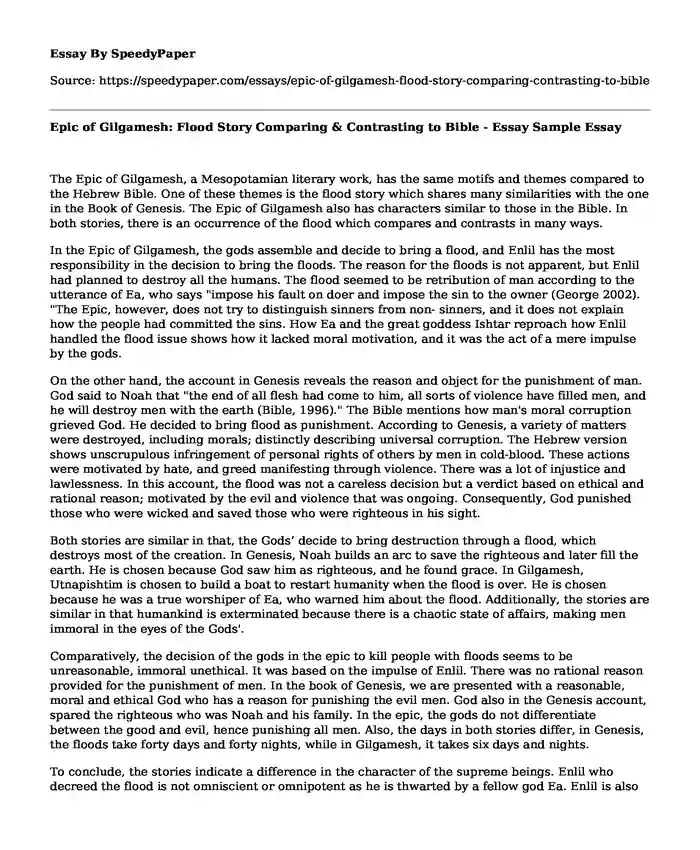
| Type of paper: | Essay |
| Categories: | Literature Bible |
| Pages: | 3 |
| Wordcount: | 766 words |
The Epic of Gilgamesh, a Mesopotamian literary work, has the same motifs and themes compared to the Hebrew Bible. One of these themes is the flood story which shares many similarities with the one in the Book of Genesis. The Epic of Gilgamesh also has characters similar to those in the Bible. In both stories, there is an occurrence of the flood which compares and contrasts in many ways.
In the Epic of Gilgamesh, the gods assemble and decide to bring a flood, and Enlil has the most responsibility in the decision to bring the floods. The reason for the floods is not apparent, but Enlil had planned to destroy all the humans. The flood seemed to be retribution of man according to the utterance of Ea, who says "impose his fault on doer and impose the sin to the owner (George 2002). "The Epic, however, does not try to distinguish sinners from non- sinners, and it does not explain how the people had committed the sins. How Ea and the great goddess Ishtar reproach how Enlil handled the flood issue shows how it lacked moral motivation, and it was the act of a mere impulse by the gods.
On the other hand, the account in Genesis reveals the reason and object for the punishment of man. God said to Noah that "the end of all flesh had come to him, all sorts of violence have filled men, and he will destroy men with the earth (Bible, 1996)." The Bible mentions how man's moral corruption grieved God. He decided to bring flood as punishment. According to Genesis, a variety of matters were destroyed, including morals; distinctly describing universal corruption. The Hebrew version shows unscrupulous infringement of personal rights of others by men in cold-blood. These actions were motivated by hate, and greed manifesting through violence. There was a lot of injustice and lawlessness. In this account, the flood was not a careless decision but a verdict based on ethical and rational reason; motivated by the evil and violence that was ongoing. Consequently, God punished those who were wicked and saved those who were righteous in his sight.
Both stories are similar in that, the Gods’ decide to bring destruction through a flood, which destroys most of the creation. In Genesis, Noah builds an arc to save the righteous and later fill the earth. He is chosen because God saw him as righteous, and he found grace. In Gilgamesh, Utnapishtim is chosen to build a boat to restart humanity when the flood is over. He is chosen because he was a true worshiper of Ea, who warned him about the flood. Additionally, the stories are similar in that humankind is exterminated because there is a chaotic state of affairs, making men immoral in the eyes of the Gods'.
Comparatively, the decision of the gods in the epic to kill people with floods seems to be unreasonable, immoral unethical. It was based on the impulse of Enlil. There was no rational reason provided for the punishment of men. In the book of Genesis, we are presented with a reasonable, moral and ethical God who has a reason for punishing the evil men. God also in the Genesis account, spared the righteous who was Noah and his family. In the epic, the gods do not differentiate between the good and evil, hence punishing all men. Also, the days in both stories differ, in Genesis, the floods take forty days and forty nights, while in Gilgamesh, it takes six days and nights.
To conclude, the stories indicate a difference in the character of the supreme beings. Enlil who decreed the flood is not omniscient or omnipotent as he is thwarted by a fellow god Ea. Enlil is also blamed for not being reflective in the epic. Holzinger describes the gods in the epic as pagan in their toleration of lies, in their behaviour, the reversal of their moods and how they deal with people (George 2002). On the other hand, in Genesis, the account is based on monotheism, and there is no deception, division or opposition. The God of Genesis is a noble character with absolute sovereignty. He promises that water will never destroy flesh again, but he does not regret his decision (Bible 2006). His decision was unmistakable and clear based on moral judgment. The Genesis account is a strong illustration of divine justice which manifests in strong punishment, delivering the righteous.
References
Bible, K. J. (1996). King James Bible. Proquest LLC.
George, A. (Ed.). (2002). The epic of Gilgamesh: The Babylonian Epic Poem and Other Texts in Akkadian and Sumerian. Penguin.
Cite this page
Epic of Gilgamesh: Flood Story Comparing & Contrasting to Bible - Essay Sample. (2023, Nov 15). Retrieved from https://speedypaper.net/essays/epic-of-gilgamesh-flood-story-comparing-contrasting-to-bible
Request Removal
If you are the original author of this essay and no longer wish to have it published on the SpeedyPaper website, please click below to request its removal:
- Free Essay on Religious Themes in Sura 6 of Quran
- Essay Sample Dedicated to Arnold Schwarzenegger
- Literary Essay Sample on Racism Exposed in Cry, The Beloved Country
- Incidents in the Life of a Slave Girl - Literary Essay Example
- Dialogue on the Problem of Evil - Paper Example
- Mental Health in Virginia Woolf's "Mrs Galloway" - Essay Sample
- Three Main Kinds of Irony in the Cask of Amontillado - Paper Sample
Popular categories




